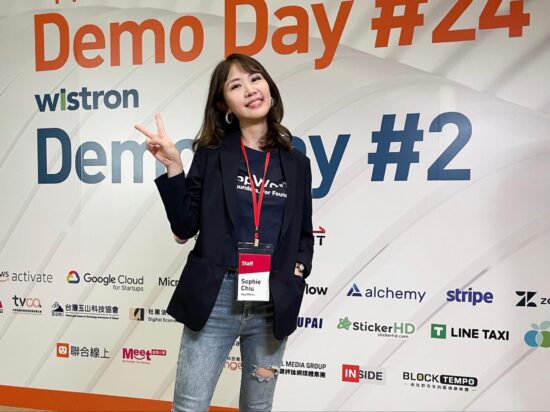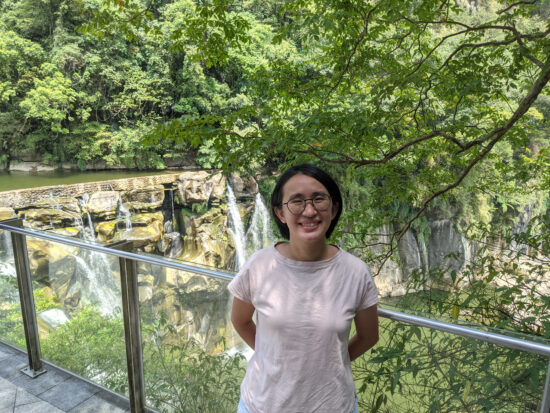
Sophie Chiu, Associate (邱敬媛 / 投資經理)
Sophie is an Associate in the investment team. Before joining AppWorks in 2020, Sophie had 10 years of experience covering public equities. She was part of the portfolio management team at Neuberger Berman, focusing on emerging market opportunities. Prior to that she served as a research analyst at Credit Suisse, JPMorgan, and London-based Autonomous Research. Sophie holds a Master of Finance with distinction from Warwick Business School and BS Finance from National Taiwan University. Her passion and expertise, however, extend far beyond just researching companies and industries. She is also an author of two published poetry books and holds a keen interest in human psychology and human behavior.
Butterflies, Founders, and Phoenix
It may seem odd to some, but in my spare time I write poetry and have published two poetry books before joining AppWorks. One particular story to share as a prelude to introducing myself: The title I gave my second book is inspired by the migratory swarm of the Common Mormon Butterfly, a swallowtail butterfly widely distributed across Taiwan and Asia. Every three-to-six years, an unusually large number of caterpillars will hatch and transform. Then this major swarm of migrating butterflies will soar above the ocean. However, almost all of them will perish on the journey, as if death is the only purpose of this migration. That three-to-year period can mean tens of generations for a butterfly with a fleeting longevity of merely two months. Reincarnated again, they still choose to embrace the high possibility of death and failure. There must be some kind of ecstasy behind this action, this natural impulse to challenge. Something that’s deeply written into their DNA.
This thought permeated into my mind. I started to reflect on the nature and meaning of my work. Before joining AppWorks, I had a 10-year career in the equity stock market. I graduated and then worked in London for a year. I moved back to Asia, spending three years in Hong Kong and six years in Taiwan. I was a research analyst working through a full cycle of jobs from a sell-side analyst to the buy-side portfolio manager team. As a researcher, the nature of my work was to observe and predict. However, the objective itself was trading and profiting. Was this the natural instinct coded into my DNA??
Around the time I published my second book of poems. I met a founder, a young fellow who had worked on a startup for five years. He was totally different from most of the senior executives and chairpersons I met in the equity market. He reminded me of a founder I always admired – Qi Ji, the founder of Nasdaq-listed H World Group. Ji is also the co-founder of Trip.com, a China-based OTA with a market cap on par with Expedia. Ji is one of only few founders that still runs the company among all leading hotel groups in China. In his early days, he aimed to make H World Group an international brand in parallel to those hotel giants. H World Group was founded in 2005, listed in 2010, and reached a major milestone in 2016, building an alliance and mutual shareholding structure with Accor, a French hotel group and the largest hospitality group in Europe. From the outside, the evolvement is remarkable. Financially, it’s extraordinary: H World’s average room rate, margin, growth, and valuation have grown leaps and bounds above its peers. Not to forget, this is a business that involves high operational complexity, high similarities in products, and extremely high competition. Ji’s success is ultimately built upon his ambition, leadership, persistence for quality, and aggressive attack.
Are founders all so crazy? Like butterflies that are determined to challenge the sea? The young startup founder I met in 2018 certainly seemed so. He ended up becoming my husband, currently, hopefully always. Founders’ passion and grit are contagious. I wished to stay closer to this community. Therefore I made a career change, seemingly suicidal to many of my ex-colleagues, to join AppWorks in 2020. I prefer the analogy of a phoenix though. I have become a venture capitalist yet am still a researcher. The nature of my work is still to observe and predict. But the objective is not trading but rather contributing my brain and heart to the founders’ life work of creating value for the world.
The world, in physics or thermodynamics precisely, is always in the direction of chaos until no energy is left. Conceptually, founders are the creatures/aliens that bring this world a new stream of stimulus, alternatives, and energy. Therefore the world will always be revived with new possibilities. However, it is not easy; it is incomparably tough. (Note: Trust a founder’s wife’s intuition here.) Just like a butterfly fluttering across the sea. Yet, there are still those very few that reached the promised land – a biologist, one of my readers, told me so after reading my book. Any movement of your wing eventually contributes to the world’s evolution.
I’m closing my article here with best wishes to all founders around the world. I’m Sophie. I have a decade of experience in research and financial analysis. I am particularly intrigued by consumer, e-commerce, and IOT industries, as well as the overall digital economy in Southeast Asia. You’re welcome to reach out to me at AppWorks.
像蝴蝶一樣瘋狂的創業者,重新精彩了我的職涯
2018 年初我和詩人前輩舉辦了一場新書座談,當時我的第二本詩集 《一定曾經有狂喜 才讓追逐深深寫進基因裡》甫出版六個月 (先別轉台這是鋪陳)。詩集名稱的靈感是跟台灣常見的玉帶鳳蝶有關:每三到六年的週期,玉帶鳳蝶會出現一次大發生現象,即數十萬到上百萬隻在中南部山區羽化,並西向往海飛去,然而絕大多數的蝴蝶會在海面上死亡,幾乎無蝶倖免,彷彿死亡是這旅程唯一的目的。三到六年對壽命僅有兩個月的蝴蝶來說可以輪迴數十個輩子,再有來生,蝴蝶仍然會選擇往海飛去,選擇高度失敗的可能。這之中必然有什麼狂喜,才讓追逐深深寫進基因裡吧?
這個念頭像一個種子,讓我開始思考自己工作的本質。在 2020 年來到 AppWorks 以前,我已經在股票的二級市場從業十年,包括倫敦一年、香港三年、台灣六年,從俗稱賣方 (Sell-side) 的外資券商,到俗稱買方 (Buy-side) 的基金公司,這份俗稱研究員的工作,本質是觀察與預測,然而工作目標不免俗地必須是交易、是賺錢。這是我心中的狂喜嗎?我思忖。
在詩集出版的時間點,我恰巧結識了一位創業者,創業五年的小伙子。跟我在資本市場觀察的商業大佬們截然不同,但是讓我想起一直很欣賞的華住酒店集團創辦人、同時也是攜程旅遊集團共同創辦人的季琦,而跟其他中國的上市飯店集團不同,他是唯一一位仍然在線上崗的創辦人,創業初期即發下豪語要跟國際飯店集團平起平坐,從 2005 創辦華住、2010 上市、直到 2016 與歐洲最大的飯店集團 – 雅高集團 – 交叉持股,從結果來看平步青雲,從財務來看相當優秀:飯店每晚單價、利潤率、增速、估值,總是遙遙領先同行,尤其在這樣的產業,高度同質性、高度運營複雜性、高度競爭狀態,其中的卓越要歸功於季琦的領導,懷拽貌似不可實現的遠大目標、堅持質感、但是狼性出擊。
創業的人都是這麼瘋狂、具有飛蛾撲火的特質嗎?我認識的那位創業小伙子似乎也是如此,後來他成為了我的先生。也因此我決定轉換工作跑道,渴望來到充滿創業者的地方,感受這些熱情與爆發力,於是我加入了 AppWorks,貌似是職涯自殺式的選擇,但也許人最終都是置死地而後生;在這裡我是一名 VC 創投業者,依然是一名研究員,本質依舊是觀察與預測,但工作目標終於不是交易,而是憑藉自己的所學所長,輔佐每個充滿鬥志的創業者,一起創造價值,為這個世界。
世界,在熱力學的真理中,是不斷在往混沌前進,能量持續地被消耗、倦怠,然而這裡的假設是世界唯有一個並且不可改變。創業者為既有的世界帶來新的刺激、新的替代選擇,就帶來了新的能源,新秩序的可能。這並不容易,是無比艱辛,跟蝴蝶要穿越大海一樣困難。但終有少數,最後真的飛到了彼方,這是一位做生物研究的讀者在新書座談會後跟我說的。而這些蝴蝶的振動,無論大小,無論強弱,最終都貢獻了整個世界的前進。
祝福所有的創業者,抵達令你狂喜的遠方。我是 Sophie,財務分析與產業研究十年以上經驗,對消費產業、電商、東南亞數位經濟、物聯網多有研究,歡迎多來 AppWorks 與我交流。



